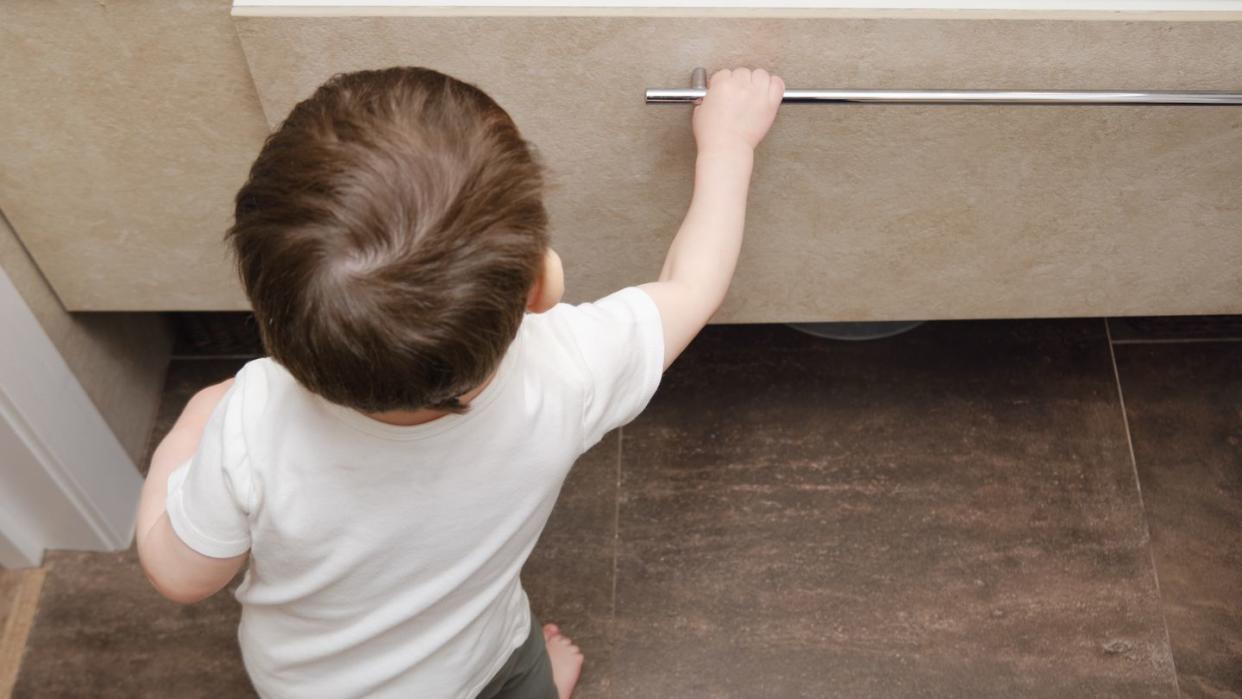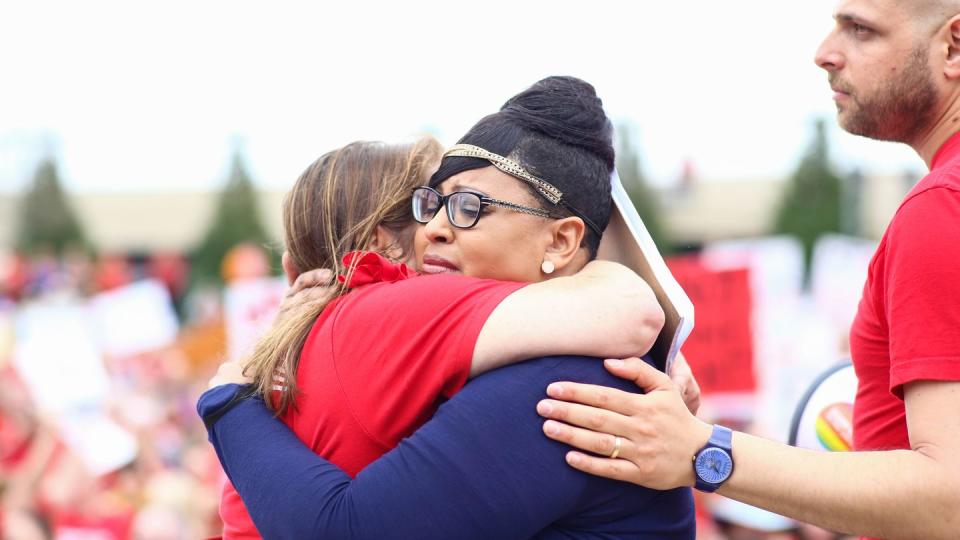This Holiday Season, Take Extra Care to Store Your Guns to Keep Kids Safe

Crazy holiday energy is one reason to love this time of year — your children will always remember how all the cousins tore through the house on Thanksgiving, Christmas, Kwanzaa or whatever your family celebrates, sneaking cookies and hunting for hidden presents. But it's also an important time of year to take extra safety measures if you own a gun.
"Unintentional shootings occur most frequently at times when children are likely to be home," says Annie Andrews, M.D., a pediatrician and Senior Advisor at Everytown for Gun Safety. "It's critical to get the secure storage message across at this time of year, especially if kids are looking for hidden holiday presents in closets or nightstands."
Think about it: We lock up cleaning chemicals, childproof electrical sockets, strap our squirming kids into car seats, build fences around our swimming pools and scour the menu for food allergens. There is absolutely no way we’d take a chance with the people we hold most dear, right?
Yet unsecured guns at home are a big reason that gun deaths (including unintentional shootings and suicides) have surpassed car crashes and illness as the number one killer of kids ages 12 months to 19 years. In fact, some 30 million little ones live in households with guns (up 7 million since 2015, according to 2021 research), and 4.6 million of these children are in a home with at least one loaded, unlocked gun.
For lots of reasons, including misconceptions about gun safety, keeping guns out of kids’ reach is something even careful parents don’t always do. The results are beyond tragic, yet children dying because of firearms every day is something we have come to expect. Just in March, a 3-year-old unintentionally shot her four-year-old sister in Houston, with an unsecured pistol. Each parent thought the other was watching the kids, the sheriff told CNN.
But there are some rules you can follow to protect your babies in your house and at the homes of others, experts say, no matter how old they are.
Kid-proof your firearm storage
Ideally, this means keeping guns unloaded, locked up and separate from ammunition, says Johanna Thomas, Ph.D., a licensed certified social worker and college professor in Arkansas who does gun violence prevention education through the Be SMART for Kids program.
But the best method of storage, such as safes or locks, is one that you’ll use. “Most gun safes allow you access in three seconds,” says Thomas, who sees that brief pause not as an impediment but rather crucial time to make sure she doesn’t unintentionally fire in haste. “In that three seconds I can decide, is it my teenager coming in through the window or the dog in the living room? Three seconds can mean the difference between life and death,” she says.
Count on kids being relentlessly curious
Of course you tell your kids to stay away from firearms, but “how many times do we tell our children not to touch our cell phones, to stay away from the remote?” says Thomas. “Children as young as two can fire a firearm, and it’s so easy for them to grab.” And up on a high shelf isn’t good enough — Christmas presents stored high up or in the back of the closet are no match for a determined child, and neither are guns.
Talk to other parents about guns in their cars or homes
Normalize having a quick gun storage conversation when your kid has a playdate at someone’s home — even when you send your child to stay with family. Because firearms have become such a hot-button topic, you may be nervous to bring it up, but you'd be surprised at how easy it is, says Thomas.
“The vast majority of parents want to talk about firearm safety,” agrees Kelsey Gastineau, M.D., a Moms Demand Action volunteer and board-certified pediatrician based in Nashville, referring to her patients’ families. No matter a parent's views on gun ownership or gun laws, “no one wants their child to be harmed,” says Dr. Gastineau, who advises keeping the chat focused on injury prevention, rather than politics or laws or the Second Amendment.
To make the topic less awkward with parents you don’t know well, “I offer information about my home first," says Thomas. “I put it out there: I have four dogs, all kid-friendly, an enclosed swimming pool with an alarm and our meds are kept in a safe,” she says. She also informs parents that she has two firearms, stored unloaded in safes, separate from ammunition. Your disclosure makes it easy for the other parent to share their situation.
“We need to release the stigma—just like we don’t want our children getting into painkillers or the bourbon stash, we need to make firearms part of the list of things we ask about,” she says, and adds having the conversation over text is even easier.
If the other parent reacts poorly or doesn’t store their firearms safely? Offer to have her child over to your place or meet in the park, Thomas suggests.
Talking to kids about guns — or even training them in gun safety — isn’t enough
The allure of picking up a gun to see what it feels like wins out over what they've been taught almost every time — it's just the way kids are. “The one time they find the firearm and can’t help playing with it, that may be the difference between life and death,” says Dorothy Novick, M.D., a pediatrician at Children’s Hospital in Philadelphia who works on gun safety issues. Unfortunately, studies show that even training children in firearm safety does not prevent them from playing with a gun when no adults are supervising. “We cannot rely on the kid to keep themselves safe,” she says.

JaJuan McDowell, age 14, knew to stay away from an unsecured gun, says his mom Julvonnia, who, with her husband, a military member, talked to him about it and explained the lethality of firearms. Yet when JaJuan went to visit his uncle for spring break seven years ago, he and another teen got to playing with an unsecured firearm, and the other child unintentionally killed him. “You never know what a child will do with peer pressure,” says Julvonnia. "JaJuan knew not to play with an unsecured gun. I would never have imagined this, no."
Julvonnia is now a volunteer with Moms Demand Action in Atlanta, and has made it her mission to spare other families what hers has been through. “It doesn't just impact our family — there's a ripple effect on his classmates, friends, cousins, church members...multiple people are affected emotionally and mentally," she says. "Walking into a restaurant and remembering that you're no longer a family of four, but a family of three...it's hard to describe how that feels. Each of us has a moral responsibility to have firearms securely stored."
That doesn't mean you shouldn't talk to children about how dangerous guns are — it's necessary, but not sufficient, says Dr. Gastineau. “I appreciate when parents tell their kids to not touch guns and to tell and adult," she says. "But that should not be where it ends. At the end of the day, it’s the adult’s responsibility to keep them out of children's hands.”
The below discusses suicide. If you or someone you know needs help, options include: Calling the U.S. National Suicide Prevention Hotline at 800-273-TALK (8225); calling 911; or calling a friend or family member to stay with you until emergency medical personnel arrive to help you.
Suicide — no matter how unthinkable — does happen
Suicide is the biggest cause of gun deaths overall, and firearm suicides in young people are up 53% over the last ten years, according to CDC data. Research shows that often parents have no idea of their adolescent’s suicidal thoughts — all the more reason to make sure kids cannot access guns. “It can be an incredibly impulsive act,” says Dr. Novick, who gives out free gun locks to patients’ parents. Guns are also incredibly good at what they do, says Dr. Novick. "Nine times out of ten, if you use a firearm to kill yourself, you will succeed.” Other methods of attempted suicide, such as drugs or even jumping, are far less likely to work, according to research.
Consider not having a gun in your home
Research shows that the safest home for a child is one without guns, according to the American Academy of Pediatrics. Your intention may be to keep your family safe, but family members are often harmed by the very gun you keep for their protection. Among children younger than 12 who are killed with a gun, 85% are killed in their own home, and the vast majority of these deaths are self-inflicted or at the hands of another child, according to the Children’s Hospital of Philadelphia’s Center for Violence Prevention. If you do decide you need or want a firearm, safe storage is an absolute must, says Thomas. “Most of the gun owners I know are responsible or want to be responsible and just need more information,” she says.
For more information on gun safety, visit Kids Health and Everytown.
You Might Also Like


